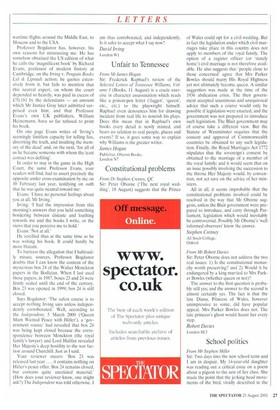Constitutional problems
From Dr Stephen Cretney, QC Sir: Peter Oborne (`The next royal wedding'. 18 August) suggests that the Prince of Wales could opt for a civil wedding. But in fact the legislation under which civil marriages take place in this country does not apply to members of the royal family. The option of a register officer (or 'stately home') civil marriage is not therefore available. He also suggests that 'people close to those concerned' agree that Mrs Parker Bowles should marry His Royal Highness yet not ultimately become queen. A similar suggestion was made at the time of the 1936 abdication crisis. The then government accepted unanimous and unequivocal advice that such a course would only be possible if legislation were enacted; and the government was not prepared to introduce such legislation. The Blair government may of course take a different view. But the Statute of Westminster requires that the consent and approval of Commonwealth countries be obtained to any such legislation. Finally, the Royal Marriages Act 1772 stipulates that the sovereign's consent be obtained to the marriage of a member of the royal family; and it would seem that on an issue possibly involving the succession to the throne Her Majesty would, by convention, not act save on the advice of her ministers.
All in all, it seems improbable that the constitutional problems involved could be resolved in the way that Mr Oborne suggests, unless the Blair government were prepared to introduce, and carry through Parliament, legislation which would inevitably be controversial. Possibly Mr Oborne's 'well informed observers' know the answer.
Stephen Cretney
All Souls College, Oxford


























































 Previous page
Previous page